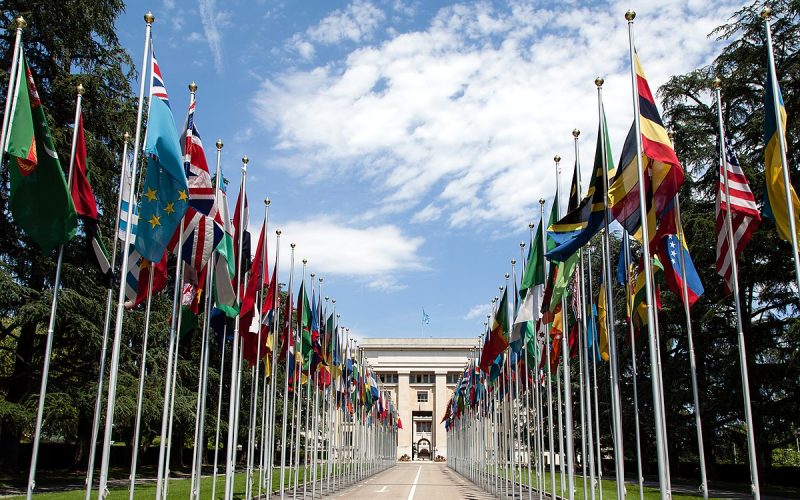Studying international relations in Nigeria can be a great choice if you’re curious about how the world works and want to understand global politics, diplomacy, and economics. Nigeria’s diverse population and rich history provide a unique environment for studying global affairs.
Studying international relations in Nigeria can open up a world of career opportunities, from understanding how governments interact with each other to learning how to negotiate international agreements.
Many universities in Nigeria offer international relations courses. Some focus on politics, others emphasize diplomacy, and others focus on economics. No matter your interests, there’s a university out there that can help you develop the skills you need to succeed.
In this article, we will discuss everything you need to know about international relations, from international relations courses to program types and the best schools to study international relations in Nigeria.
Table of contents
- What type of course is international relations?
- What exactly do you study in international relations?
- Is international relations a good degree?
- Is international relations a BA or BSC?
- Is it hard to study International Relations?
- What can I become if I study International Relations?
- Is international relations a good paying job?
- International relations courses in Nigeria
- Which university is best for international relations in Nigeria?
- Private universities offering international relations in Nigeria
- Federal universities that offer international relations in Nigeria
- How many years is international relations course in Nigeria?
- International relations program type in Nigeria
- What type of bachelor is international relations?
- FAQs – International Relations courses
- Conclusion
- References
- Recommendations
What type of course is international relations?
International relations is a field of study that examines how countries interact with each other on a global scale. It covers various topics, including politics, diplomacy, economics, and cultural exchange.
If you study international relations, you’ll learn about how governments make decisions, how different countries work together (or don’t work together!), and how global events affect people worldwide. You’ll also explore the history of global affairs, from ancient civilizations to modern superpowers.
International relations is a fascinating and complex field, and it’s constantly changing. No matter what your interests are, studying international relations can give you a unique perspective on the world. You’ll learn to think critically about global affairs and develop the skills you need to navigate complex political and economic landscapes.
See: The Best International Relations and Affairs Colleges 2024
What exactly do you study in international relations?
When you study international relations, you’ll learn about many different topics, including:
- Political systems: How countries organize their governments, from democracies to dictatorships.
- Diplomacy: How countries negotiate with each other, from trade agreements to treaties and alliances.
- Economics: How countries trade with each other and how global economic forces shape the world.
- History: How the world has changed and historical events have shaped modern politics and economics.
- Culture: How different cultures interact with each other and how cultural exchange shapes global affairs.
You’ll also learn about specific topics within the field, such as:
- Geopolitics: How geography affects global politics, such as the strategic importance of certain regions or resources.
- Conflict: How conflicts start, how they escalate, and how they are resolved (or not).
- Human rights: How different countries approach human rights issues, and how international law affects these issues.
- Globalization: How technological advancements and economic integration are changing the world, for better or worse.
- Development: How countries develop, from economic growth to social progress.
Is international relations a good degree?
Getting an international relations degree is a smart choice if you want to open up many career options. Your degree will give you the skills you need to work in various industries, from politics to non-profit organizations to business.
For instance, you could work as a policy analyst, helping the government make decisions about foreign affairs. Or, you could work as an immigration consultant, assisting people to move to other countries.
You could also work in a museum, helping to organize exhibits about different cultures and their interactions.
Is international relations a BA or BSC?
International Relations can be studied as a Bachelor of Arts (BA) or Bachelor of Science (BSc) degree.
A BA in International Relations focuses more on the human side, such as international relations’ cultural and historical aspects. You might learn about different languages, religions, and political systems.
On the other hand, a BSc in International Relations focuses more on the scientific side of things, such as the physical sciences and technology. You might learn about the environment, global health, and economic development.
Is it hard to study International Relations?
A Master’s in International Relations can be challenging. You’ll need to develop many skills, such as research, writing, and understanding different cultures.
You’ll also have to learn about politics, economics, and how to communicate in at least one language other than your own.
You’ll need to think globally, understand how different countries interact, and be able to put yourself in the shoes of other people from different cultures. Plus, you’ll have to write papers, give presentations, and work on group projects, which can be a bit challenging.
What can I become if I study International Relations?
Studying International Relations can open a lot of doors for you. You could become a Diplomatic Officer and help countries work together. You could be an International Development Specialist, assisting countries to grow and strengthen.
Or maybe you’d prefer to be an Intelligence Analyst, learning about different countries and figuring out what they’re up to.
You could also work as a Communications Officer, making sure that countries understand each other and get along. Or, maybe you’d like to be an Immigration Specialist, helping people move to different countries.
There are so many options!
What is the job description of international relations?
If you work in international relations, you’ll be helping countries work together in various ways. You might help make policies that help countries get along, or you could help solve problems between countries.
Your job might be to talk to other countries and ensure they understand what’s going on, work on projects that help countries grow and develop, or prevent wars and conflicts between countries.
Basically, your job is to ensure that countries worldwide are getting along and working together.
Is international relations a good paying job?
Working in international relations can be a great career choice. It can be exciting and rewarding work, but the pay can be pretty good too. If you’re lucky enough to land a job as a Diplomatic Officer or Intelligence Analyst in Nigeria, you could be looking at annual salaries in the millions of Naira!
Of course, these high-paying jobs can be competitive, but even entry-level positions in international relations tend to pay pretty well.
The great thing about working in international relations is that so many different jobs are available. You could work in diplomacy, politics, development, or even business. And because these jobs involve working with different countries, you might have the chance to travel and see the world.
Plus, working in international relations can give you a chance to make a real difference in the world. If you’re passionate about making a positive impact, this could be your perfect career.
So, what kind of salaries can you expect in international relations jobs in Nigeria? Well, that depends on the specific role, but let’s give you some figures to expect according to Nexford University:
- Diplomatic Officer: Between ₦8,000,000 and ₦12,000,000 per annum
- Intelligence Analyst: Between ₦6,000,000 and ₦9,000,000 per annum
- International Development Specialist: Between ₦5,000,000 and ₦8,000,000 per annum.
Also, read: Which Course is Best for Art Students in Nigeria? Top 20 Art Courses
International relations courses in Nigeria
Here are some International Relations courses you might find in Nigeria:
- African Diplomacy
- Conflict Resolution and Peace Studies
- Diplomatic History
- Foreign Policy Analysis
- Global Politics
- International Law
- International Organizations
- International Political Economy
- Introduction to International Relations
- Political Science
- Security Studies
- Strategic Studies
- United Nations Studies
- World Politics
- Diplomacy and Negotiation
- Regional Integration
This list of courses under international relations can vary depending on the school you’re applying to.
What subjects are required for international relations in Nigeria?
So, you’re wondering what subjects you need to study for international relations in Nigeria? Well, here’s a list of some of the most important ones:
- History: This will help you understand how different countries and cultures have interacted with each other over time.
- Politics: You’ll learn about the different political systems worldwide and how they affect international relations.
- Economics: Understanding economic theory and policy is essential for understanding global trade and development.
- English language and/or any other foreign language: Learning another language can be really helpful for communicating with people from different countries.
- Geography: This will help you understand the physical features of different countries and how they affect their relationships with each other.
- Sociology: Studying how people interact and form societies can help you understand the cultural and social factors that influence international relations.
- Anthropology: Learning about different societies’ cultural practices and beliefs can help you understand how people from different cultures interact.
Remember, this list of subjects can vary depending on your university. For example, one university might require you to take courses in African History, while another might require courses in International Law.
Also, universities in Nigeria might offer different international relations programs, with varying emphases on certain subjects. For example, one university might focus on economics and trade, while another might focus on diplomacy and conflict resolution.
What are the four jamb subjects for international relations?
Suppose you plan to take the Joint Admissions and Matriculation Board (JAMB) exam in Nigeria. In that case, you’ll need to study certain subjects to be eligible for admission into an international relations program. Specifically, you’ll need to focus on these four subjects according to Allschool.ng:
- English Language: This will test your English reading, writing, and comprehension skills.
- Economics: This will cover basic economic theory and policy.
- Literature in English: This will test your knowledge of English literature.
- Geography/Government/History: These subjects will test your knowledge of global geography, politics, and history.
However, according to MySchoolgist.com, the required subjects are English Language, Mathematics, and any of the following: Economics, History, Government, Geography, Literature in English, and French.
So it might be best to double-check with your school or the JAMB website to ensure you know exactly what subjects you need to study for the exam for your school of choice as these requirements vary across the different universities in Nigeria.
What is the JAMB cut off mark for International Relations and Diplomacy?
Regarding the JAMB cut-off mark for International Relations, the score you need to get into your chosen university can vary quite a bit. While some schools will accept a score as low as 180, others might require a 200 or even higher score.
For instance, at the University of Nigeria, Nsukka (UNN), the cut-off mark for History and International Studies is 265.
But even for schools accepting lower than UNN, it’s important to remember that the higher your score, the better your chances of getting into the university you want. So even though you might be able to get into some universities with a lower score, it’s still worth putting in the effort to get as high a score as possible.
Which university is best for international relations in Nigeria?
Here are some of the best universities to study international relations in Nigeria:
1. University of Lagos
If you want to study International Relations in Nigeria, the University of Lagos is one of the best choices. Located in Lagos, the university has a long academic excellence and research history, making it a top choice for students from all over Nigeria.
The International Relations course in UNILAG is one of the best in the country. It provides students with a comprehensive curriculum that covers all aspects of global politics and diplomacy.
What makes the University of Lagos stand out is its faculty. The International Relations department is staffed with experienced and knowledgeable professors who are experts in their respective fields.
One of the most renowned faculty members is Professor Adeleke Aderinoye, a highly respected expert in African diplomacy who shares his expertise with students.
The university also boasts modern facilities and resources for students studying International Relations. The department’s library has a vast collection of books, journals, and research papers related to the field.
2. Obafemi Awolowo University
Obafemi Awolowo University (OAU) is one of Nigeria’s best universities to study International Relations. It’s located in the beautiful city of Ile-Ife and has a reputation for providing students with an excellent education.
The International Relations program at OAU is top-notch. Students can study various subjects related to global politics, diplomacy, and development. The curriculum is designed to give students a deep understanding of international affairs and the issues facing countries worldwide.
At OAU, students can specialize in Africa and the developing world, which is important because it helps them understand these regions’ specific challenges. They can study African politics, regional integration, conflict resolution, and development studies.
The faculty at OAU is also really impressive. They have experienced professors who are experts in their fields and can help students learn and grow. One of the most famous alumni of the International Relations department is Olusegun Obasanjo, the former President of Nigeria. He got much of his knowledge and experience from the program at OAU!
The students at OAU get to do a lot of hands-on learning, which is valuable. They can do research projects that examine real-world issues and do internships in different places, such as government organizations, non-profit groups, and diplomatic missions.
Another cool thing is that OAU has partnerships with universities worldwide, so students can study abroad and learn about different cultures. They can go to places like the United States, the United Kingdom, or France, and get a whole new perspective on global affairs.
3. University of Ibadan
If you’re looking to study International Relations in Nigeria, the University of Ibadan is also one of the best universities. It’s located in the city of Ibadan, Oyo State, and it has a rich history of providing quality education in Nigeria.
The International Relations program at the University of Ibadan is unique. It’s not just about political science—it covers a range of disciplines, like history, sociology, and economics, so you get a really well-rounded understanding of how the world works.
The university also offers specializations within the International Relations program. You can specialize in diplomacy and foreign policy, international law, global security, or conflict resolution depending on your interests.
The university has several research centers focused on international relations. For instance, the Center for Peace and Conflict Studies focuses on resolving conflicts and building peace around the world.
And the Center for Globalization and Strategic Studies? It studies global trends and helps the Nigerian government determine the best policies.
4. Nnamdi Azikiwe University
Next up on the list of top universities for International Relations in Nigeria is Nnamdi Azikiwe University, located in Awka, Anambra State.
Nnamdi Azikiwe University offers a comprehensive Bachelor’s degree program in International Relations. The program focuses on developing students’ understanding of global politics, diplomacy, and international law.
The university’s unique approach to International Relations strongly emphasizes African studies. Students have the opportunity to explore the history, politics, and culture of Africa to global affairs.
Nnamdi Azikiwe University also offers various opportunities for practical experience. Students can participate in internships with local and international organizations, gaining firsthand experience in international relations.
In addition to the university’s focus on African studies, Nnamdi Azikiwe University has partnerships with universities in other regions, including Europe and Asia.
These partnerships provide students with opportunities for exchange programs, allowing them to broaden their horizons and gain a global perspective on international relations.
5. University of Nigeria
If you’re searching for a top-notch university to study International Relations in Nigeria, the University of Nigeria in Nsukka, Enugu State, is one to consider.
With a diverse faculty, engaging curriculum, and exciting research opportunities, the University of Nigeria is a great choice for students interested in understanding the world.
One thing that makes the University of Nigeria unique is its focus on real-world issues. Students don’t just learn about theory; they also have the chance to work on projects that make a difference.
For instance, the university’s International Relations Department hosts seminars on gender equality, climate change, and human rights. Students get to hear from experts in the field, ask questions, and explore these issues in depth.
And because the University of Nigeria is part of a global network of universities, students can participate in exchange programs and international conferences. This means they learn from different perspectives and make connections that will last a lifetime.
Plus, the faculty at the University of Nigeria is truly exceptional. They’re not just experts in their fields but also passionate about teaching and mentoring students.
Private universities offering international relations in Nigeria
Here’s a list of the private universities in Nigeria that offer international relations:
- Achievers University, Owo, Ondo State
- Afe Babalola University, Ado-Ekiti, Ekiti State
- Baze University, Abuja
- Benson Idahosa University, Benin
- Bowen University, Iwo, Osun State
- Caleb University, Imota, Lagos
- Covenant University, Ota, Ogun State
- Elizade University, Ilara-Mokin, Ondo State
- Gregory Okoye University, Enugu
- Igbinedion University, Okada, Edo
- Joseph Ayo Babalola University, Ikeji-Arakeji, Osun State
- Kings University (UNIKINGS), Ode-Omu, Osun State
- Landmark University, Omu-Aran, Kwara State
- Lead City University, Ibadan
- McPherson University, Abeokuta, Seriki-Sotayo, Ogun State
- Novena University, Amai, Delta State
- Obong University, Obong Ntak, Akwa Ibom State
- Oduduwa University, Ipetumode
- Salem University, Lokoja, Kogi State
- Southwestern University, Okun Owa
- Tansian University, Umunya, Anambra State
- Wellspring University,
Federal universities that offer international relations in Nigeria
See the best federal universities in Nigeria that offer international relations:
- Ahmadu Bello University, Zaria
- Bayero University, Kano
- Obafemi Awolowo University, Ile-Ife
- University of Benin, Edo State
- University of Ibadan
How many years is international relations course in Nigeria?
In Nigeria, an undergraduate degree in International Relations typically takes four years. Some universities might offer a five-year combined degree program, which allows students to earn both a bachelor’s and a master’s degree in International Relations.
The extra year enables students to explore specialized topics more deeply, gain more practical experience, and boost their job prospects. So, the duration of an International Relations course in Nigeria depends on the specific program and university.
International relations program type in Nigeria
The International Relations program in Nigeria is offered at both undergraduate and postgraduate levels. You can study for a Bachelor of Science (B.Sc.) or Bachelor of Arts (B.A.) in International Relations at the undergraduate level. This program typically takes four years to complete.
After completing the bachelor’s program, you might consider pursuing a master’s degree. The master’s program generally takes two years to complete and can lead to a Master of Science (M.Sc.) or Master of Arts (M.A.) degree in International Relations.
What type of bachelor is international relations?
In International Relations, you can earn either a Master of Arts (MA) or a Master of Science (MSc) degree. It really depends on the university and the specific program you’re pursuing.
For example, some universities might offer an International Relations MA, focusing more on theory, history, and culture. Other universities might offer an MSc in International Relations, which leans more toward science, data, and quantitative analysis.
So, it’s essential to check the university’s course offerings and program details you’re interested in.
See Also: The 10 Easiest University Degrees in the UK | 2024 Rankings
What type of Masters is international relations?
At the postgraduate level, International Relations can be studied as a Master of Science (M.Sc.) or a Master of Arts (M.A.).
The Master of Science (M.Sc.) in International Relations will teach you to analyze data, trends, and patterns to make sense of global politics and economics. You’ll learn all about research methods, statistics, and other quantitative tools to help you understand how the world works.
If you choose the Master of Arts (M.A.) in International Relations, your curriculum will focus more on theory, history, culture, and other social science topics.
Is it MA or MSc in International Relations?
In International Relations, you can earn either a Master of Arts (MA) or a Master of Science (MSc) degree. It depends on the university and the specific program you’re pursuing.
For example, some universities might offer an International Relations MA, focusing more on theory, history, and culture. Other universities might offer an MSc in International Relations, which leans more toward science, data, and quantitative analysis.
So, it’s important to check the university’s course offerings and program details you’re interested in.
FAQs – International Relations courses
Basic math skills are necessary, but not overwhelming.
Yes, with additional law studies or degrees.
We study IR to understand how nations interact and solve global problems.
The father of IR is considered to be Hans Morgenthau.
Conclusion
In Nigeria, several universities offer courses in International Relations, from undergraduate to postgraduate levels. Each university offers a different type of degree, so it’s essential to check the course details before applying.
Whether you’re interested in understanding global politics through math or history, there’s an International Relations course for you.
Nigeria’s universities offer a solid foundation to help you start your career in the fascinating world of international relations.
References
- nexford.edu – Is international relations a good career path?
- edurank.org – universities for International Relations and Diplomacy in Nigeria
- disciplines.ng – Universities in Nigeria Offering International Relations






